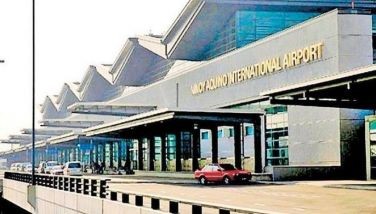Manila Bay land reclamation projects

Today’s topic conveniently belongs to the subject of “stressful economic issues and challenges.”
Manila Bay reclamation projects. The recent week included the recent action of the President Marcos to suspend all, but one of the current land reclamation projects that are intended to expand the foreshore land of Manila Bay.
The reason for this action is to examine the environmental impact of the projects. In explaining his action, the President expressed his concern about the potential that the reclamations would cause the narrowing the exit of water into the bay during periods of heavy flooding. Public fear has been expressed that the projects could worsen the problem of flooding in the city.
Hopefully, in undertaking this action, the engineering problems of improving water flow in and out of the bay would be solved. The solution can be integrated into the physical planning. In the case of a crowded metropolis such as Manila, that would be an added benefit to the urban transformation.
When ongoing projects are stopped by regulatory orders in midstream of implementation, they could lead to project derailment. If the project gets completely stopped, the invested capital of the project owners goes to waste.
The risk to those who invest in such projects are high. To start, mobilization costs for undertaking such projects involve large commitments of capital. Temporary stoppages can involve big losses in terms of resources used. Prolonged stoppages lead to cost escalations. Inefficient outcomes result as the projects get completed.
This is reminiscent of projects that have cost the nation greatly in terms of lost time in economic development. It can, of course, be said that such projects are only held up until the government finds the proper time and reason to continue them. Disruption in an undertaking creates its own costs and uncertainties. They have an impact on the nation’s speed of accomplishments in economic matters.
In fact, the reasons for undertaking actions to stop the project might be justified. Environmental concerns appear to be the main issues that led to the suspension of the ongoing Manila Bay reclamation projects. Such issues should have been fully properly evaluated during the project screening and approval stage.
Projects approved by a different government administration are likely to be more vulnerable to political criticisms, especially if laxity of treatment by previous project evaluators is suspect.
The current Manila Bay land reclamation projects have added new land to the foreshore of Metro Manila. The reclamation projects have been proceeding at a reasonably fast pace since they started during the Duterte administration. In the scheme of things, the development projects would normally suffer no implementation hindrance under a Marcos administration since the two principals are in friendly political alliance.
In fact, it would seem inconceivable that such projects would suffer suspension had they been initiated by the current administration. So, there must be other large reasons for the action of suspension of the land reclamations.
Land reclamation projects are relatively simple engineering undertakings, but in reality, they are prone to major political controversies in the Philippine experience. As such, the prime examples of the Manila Bay and Cebu foreshore land reclamations have suffered from long delays and colorful changes in project proponents. Today, they may appear to be successful reclamation of lands for commercial purposes. But in fact, they represent prominent examples of long delays in completion.
They may appear to be successful examples. When these are stopped by regulatory orders after undertaking a fair amount of work, much capital and resources have been spent on the projects. If prolonged unreasonable, stoppage could mean economic disaster for the project owners. In fact, many initiators of the early reclamation projects in the past have failed to finish their projects due to developments they could not foresee.
When large amounts of capital get tied up in forced work stoppages, the project owners are likely to lose their investments. Actively employed capital is productively used capital, but once it is frozen into inactivity, it becomes sunk capital and is laid to waste.
Our experience with land reclamation projects so far. The current commercial and property developments in the area of the Mall of Asia had their origins in the land reclamation projects that trace their origins to the 1960s. The site for the Cultural Center Complex, which includes a big luxury hotel in the late 1960s were land reclamations from the waterfronts of Manila Bay of that early period. Further reclamation efforts expanded toward the Parañaque area until the late 1970s when further reclamations stopped.
The story of the Cebu land reclamation project, which today is also a burgeoning commercial development, has a familiar similarity to the Manila reclamation project. In both areas, politics (both at the national and at the local levels) made it impossible to speed up the early completion of the projects.
(I am less familiar with the experience of land reclamations that expanded the foreshore area of the city of Manila during the American colonial period. What seems to have been accomplished during that period was the expansion of land for parks (the enlarged Luneta park), for public facilities and private buildings, and for roads along the bay area. At that time, the reclamation of land also incorporated waterways and flood control issues). Today, after decades of delayed developments, these new areas of regional growth are contributing to the economic coffers of the local governments concerned and to the growth of the national economy. In addition, the reclaimed lands provide an opportunity to undertake urban renewal projects that could enhance the physical plans of the larger community that forms the city.
It is a fact, however, that in our country, land reclamation projects undertaken during our post-independence period have been economically messy projects. They have experienced delays, stoppages, and long, political recriminations.
Such a result need not have been the case. In our experience, the grand play of political forces have forced long delays in realizing the benefits from the reclamation projects, hampering also our economic development.
For archives of previous Crossroads essays, go to: https://www.philstar.com/authors/1336383/gerardo-p-sicat. Visit this site for more information, feedback and commentary: http://econ.upd.edu.ph/gpsicat/
- Latest
- Trending
































